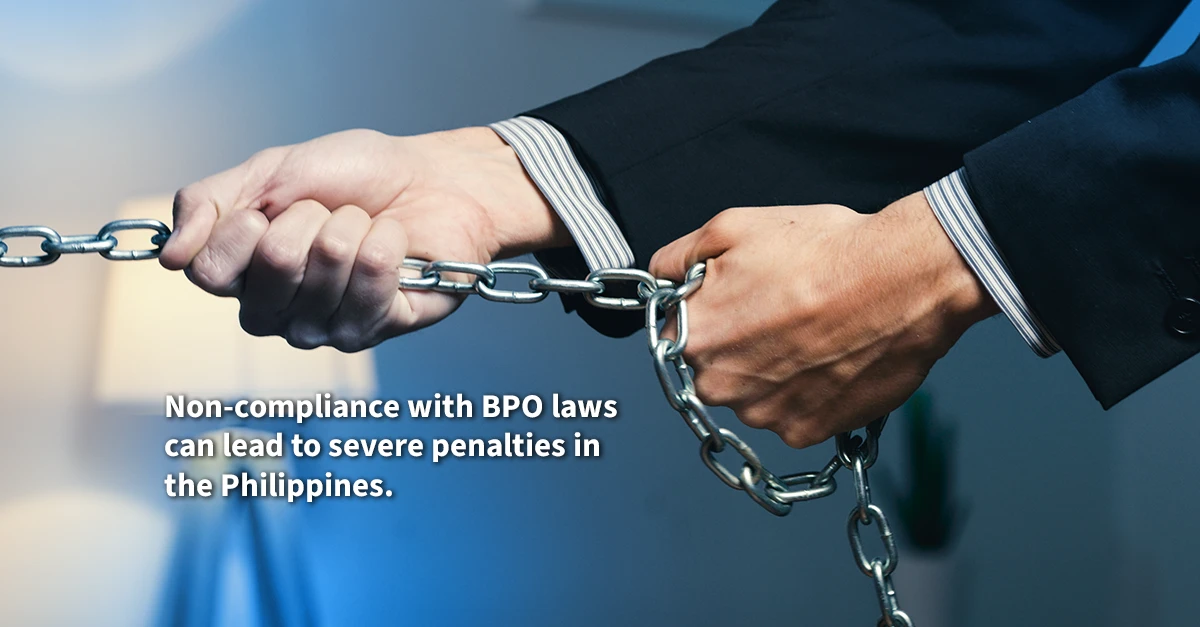Schedule a FREE call with our outsourcing expert now and get a precise quotation that meets your requirements. Don't wait - get started today!
The Philippines has established itself as a global leader in the business process outsourcing (BPO) industry. As of 2024, the BPO sector contributes approximately 7.5% to the nation’s GDP, generating $35.4 billion in revenue, with projections to reach $37.87 billion by 2025.
This guide provides a comprehensive overview of the laws governing BPO in the Philippines, their implications for the industry, and why Magellan Solutions is an ideal partner for navigating this legal landscape.
The Evolution of the BPO Industry in the Philippines
The growth of the BPO industry in the Philippines has been remarkable, evolving into one of the country’s most significant economic drivers. In 2023, the industry employed approximately 1.7 million Filipinos, and it continues to expand rapidly due to a favorable business environment, government support, and a highly skilled workforce.
Government Support and Incentives
The Philippine government has played a crucial role in fostering the growth of the BPO industry. This support includes fiscal incentives, infrastructure development, and establishing economic zones that offer tax benefits to BPO companies.
The Philippine Economic Zone Authority (PEZA) has been instrumental in this regard, with IT parks and buildings under PEZA contributing around 60% of the total BPO industry revenue in 2023.
Economic Impact
The BPO sector is a cornerstone of the Philippine economy. Alongside remittances from Overseas Filipino Workers (OFWs), it is a significant pillar, contributing significantly to GDP and providing a substantial source of foreign exchange, employment, and investment. In 2022, the industry saw an increase of 8.4% in revenue, adding 121,000 full-time employees to reach a total of 1.57 million workers.
Key Legislation Governing the BPO Industry
The BPO sector in the Philippines operates under a robust legal framework designed to protect both businesses and employees. Key pieces of legislation include:
Labor Code of the Philippines (Presidential Decree No. 442)
The Labor Code is the foundation of labor law in the Philippines. It governs all aspects of employment, including employee rights, working conditions, and dispute resolution. Adherence to the Labor Code is essential for the BPO sector, which employs a large workforce. This law mandates that employees have written contracts detailing their job roles, wages, and benefits. In the BPO industry, employees typically earn 1.5 times the minimum wage, with additional benefits such as health insurance and paid leave.
Republic Act No. 7916 – The Special Economic Zone Act of 1995
This act established PEZA, which provides fiscal incentives to BPO companies operating within special economic zones. These incentives include income tax holidays, duty-free importation of equipment, and simplified import-export procedures. PEZA-registered companies also enjoy exemptions from local taxes, significantly reducing operational costs.
In 2023, PEZA registered 27 new projects with a total investment of PHP 14.04 billion, underscoring these economic zones’ continuous growth and importance to the BPO industry.
Data Privacy Act of 2012 (Republic Act No. 10173)
Given the nature of the BPO industry, which often involves handling sensitive data, the Data Privacy Act of 2012 is particularly relevant. This law mandates that BPO companies implement stringent data protection measures to safeguard personal information.
Companies must appoint Data Protection Officers (DPOs) responsible for ensuring compliance with the law and managing data breaches. In 2022, over 3,000 data breaches were reported in the BPO sector, highlighting the importance of this legislation.
Cybercrime Prevention Act of 2012 (Republic Act No. 10175)
The Cybercrime Prevention Act addresses cyberspace-related offenses, especially pertinent to IT-BPO companies. This law covers various cybercrimes, including hacking, identity theft, and cyber-squatting. Compliance with this law is critical for BPO companies to protect their operations and data integrity.
The Role of PEZA in the BPO Industry
PEZA plays a critical role in the growth of the BPO industry by providing a business-friendly environment through its economic zones. As of 2023, there are over 400 PEZA-registered IT parks and buildings across the Philippines, many of which are located in Metro Manila. These zones are designed to attract foreign investments and offer numerous benefits, including tax incentives and world-class infrastructure.
Key Benefits:
- Tax Incentives: Companies operating in PEZA zones benefit from income tax holidays and exemptions from local taxes, which significantly reduce operational costs.
- Infrastructure: These zones offer advanced telecommunications and reliable power supplies, ensuring uninterrupted business operations.
Common Outsourcing Models and Their Legal Implications
BPO companies in the Philippines typically operate under various outsourcing models, each with distinct legal considerations:
Offshore Outsourcing
This model involves foreign companies outsourcing services to BPO providers in the Philippines. Approximately 75% of the Philippines’ BPO revenue comes from U.S.-based clients. Legal considerations for offshore outsourcing include compliance with Philippine laws and the regulations of the client’s country, particularly concerning data protection.
Nearshore Outsourcing
Countries like Australia also leverage Philippine BPO services, contributing about 10% of the industry’s revenue. Legal implications for nearshore outsourcing focus on compliance with regional trade agreements and local data protection laws
Onshore Outsourcing
Onshore outsourcing involves local companies in the Philippines outsourcing processes within the country. This model is significant for domestic businesses looking to optimize costs while complying with local labor and tax laws.
Compliance and Regulatory Challenges
Operating in the Philippines’ BPO industry involves navigating various compliance and regulatory challenges. Key areas include:
Data Privacy Compliance
Data privacy is a significant concern, especially given the sensitive nature of the information handled by BPO companies. The Data Privacy Act mandates strict compliance with data protection standards, including appointing DPOs and implementing robust cybersecurity measures. Non-compliance can result in fines of up to PHP 5 million.
Labor Law Compliance
The Department of Labor and Employment (DOLE) conducted over 2,000 inspections of BPO firms in 2022 to ensure adherence to labor standards. BPO companies must comply with the Labor Code to avoid legal disputes and ensure the welfare of their employees.
Intellectual Property Protection
Protecting intellectual property (IP) is vital for BPO companies, particularly those involved in IT and software development. In 2022, the Intellectual Property Office of the Philippines (IPOPHL) reported a 12% increase in IP filings from the BPO sector, reflecting the growing importance of IP protection in the industry.
The Impact of BPO Laws on Foreign Investments
Foreign investment in the Philippine BPO industry remains robust. In 2022, the Board of Investments (BOI) approved $1.5 billion in foreign investments, underscoring the sector’s attractiveness. The Philippines’ solid legal protections and attractive fiscal incentives make it a preferred outsourcing destination.
Why Outsourcing to the Philippines Remains a Top Choice
Despite the challenges, the Philippines remains a top choice for outsourcing due to several strategic advantages:
English Proficiency
The Philippines ranks second in Asia for English proficiency, making it an ideal location for BPO operations that require strong communication skills. This linguistic capability is crucial for maintaining high-quality service standards in customer support, technical support, and other outsourced services.
Cost-Effective Solutions
The average salary for a BPO employee in the Philippines is significantly lower than in Western countries, making it a cost-effective solution for businesses. This cost advantage, combined with the quality of service, makes the Philippines a highly competitive outsourcing destination.
Cultural Affinity
The Filipino workforce is known for its adaptability and cultural affinity with Western countries, particularly the United States. This cultural compatibility enhances collaboration and service quality, making the Philippines an attractive outsourcing hub.
How Magellan Solutions Navigates the Legal Landscape
Magellan Solutions is well-equipped to navigate the complex legal environment of the BPO industry. We ensure compliance with all relevant laws, providing our clients with secure and reliable services.
- Data Privacy and Security: We have appointed Data Protection Officers to oversee compliance and have implemented robust data protection measures.
- Labor Law Adherence: Our employment practices comply with the Labor Code, ensuring fair treatment and employee benefits.
- Regulatory Expertise: Our legal team stays updated on the latest industry regulations, allowing us to provide tailored solutions that meet all legal requirements.
Partnering with Magellan Solutions for Legal Compliance
Navigating the business process outsourcing law in the Philippines can be complex, but companies can fully capitalize on outsourcing’s benefits with the right partner. Magellan Solutions stands out as a trusted partner, offering top-notch BPO services and expertise in legal compliance.
With our extensive experience and commitment to excellence, Magellan Solutions ensures that your outsourcing operations are efficient and fully compliant with the law. Contact us today to discover how we can help you achieve your business goals while adhering to the highest legal standards.
















